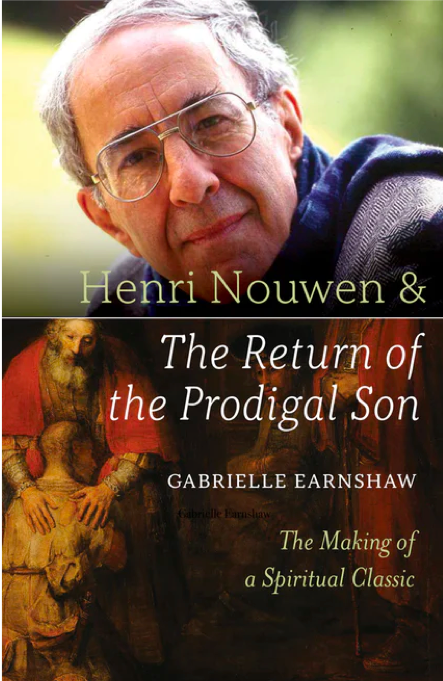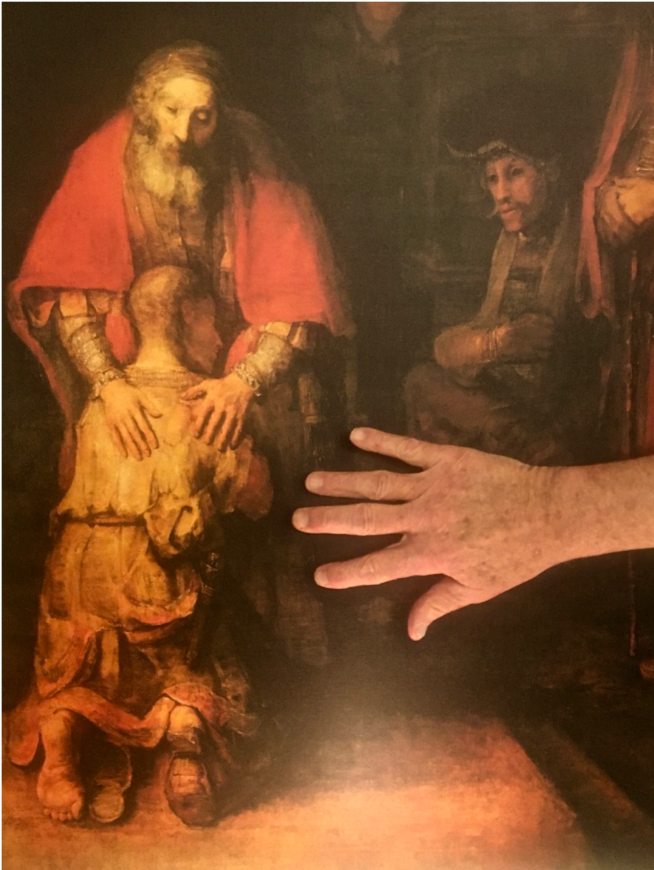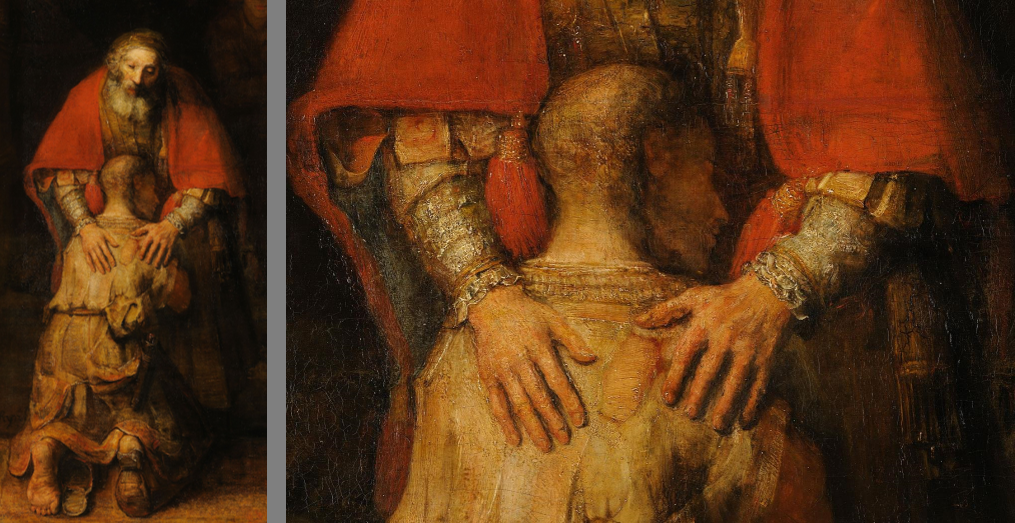Reading: None. Review the book and our discussion.
As I look at my own aging hands, I know that they have been given to me
to stretch out toward all who suffer, to rest upon the shoulders
of all who come, and to offer the blessing that emerges
from the immensity of God’s love. (p. 139)
As we enter Holy Week, we come to the end of another Henri Nouwen Society book discussion made fruitful through your participation and the thoughtful, inspiring and meaningful comments shared by many of you.
For me personally, our time together led me to reflect on my own journey over the past sixteen years: from when I first read The Return of the Prodigal Son in 2004 primarily from the perspective of the younger son to today as I seek to become the compassionate father to my children and grandchildren and to all of God’s children that my wife Dawn and I meet along the way. As is the case for many, Henri’s writing seems to apply directly to my own experience, and that is certainly true here. Shown below are excerpts from the Prologue and the Epilogue that help me to better understand my journey and my calling.
From the Prologue: I came to Daybreak in August 1986 with the conviction I had made the right choice . . . I became more and more aware of how long I have played the role of observer. . . had I, myself, really ever dared to step into the center, kneel down, and let myself be held by a forgiving God? . . . . I have been led to an inner place where I had not been before. It is the place within me where God has chosen to dwell. . . . and says, “You are my beloved son”. . . To make my home where God has made his, this is the great spiritual challenge. . . When I first saw Rembrandt’s painting, I was not as familiar with the home of God within me as I am now. . . I have a new vocation now. It is the vocation to speak and write from that place back into the many places of my own and other people’s restless lives. . . . The only way to that place is prayer, unceasing prayer.
From the Epilogue: (T)he greatest gift from L’Arche is the challenge of becoming the Father. . . the true call is to become a father who only blesses in endless compassion, asking no questions, always giving and forgiving, never expecting anything in return. . . . My people, whether handicapped or not. . . seek a father who can bless and forgive without needing them in the the way they need him. . . (and) to convince them that. . . there is a safe place to return to and receive an embrace. . . . True fatherhood is sharing the poverty of God’s non-demanding love. (Note: Henri concludes the Epilogue with the quote at the top of this post.)
You are encouraged to look back on your own spiritual journey with the insights you have gained from this book. Are you the younger son, the elder son, or the father today and why? Are there other times in the past when you were living as a different character from the parable? Do you feel called to become the compassionate father? How do you feel about your responses? Are there things you might do differently or disciplines you may adopt in the future? Please share what you discover to the extent you are comfortable.
Announcing a Special Summer 2020 Book Discussion. It gives me great pleasure to announce that the Henri Nouwen Society will be holding a special summer 2020 book discussion that is the ideal follow on to our Lenten one. We will read and discuss the new book Henri Nouwen and The Return of the Prodigal Son: The Making of a Spiritual Classic by Nouwen scholar Gabrielle Earnshaw, the founding archivist for the Henri J.M. Nouwen Archives and Chief Archivist for the Henri Nouwen Legacy Trust. The book will be published by Paraclete Press on May 12, 2020. For more information:

Drawing from extensive research in Nouwen’s archives, this book provides a detailed account of how the The Return… came to be written, shedding light on Nouwen’s writing process and aspects of his life experience that influenced his insights and ideas. Finally, Gabrielle explores how Nouwen himself was changed by the book and why twenty-eight years later this spiritual classic continues to touch the hearts and minds of 21st century readers.
Plan to join us on Wednesday, June 10th for Welcome and Introductions. The discussion begins on Sunday, June 14th and will run until mid-July.
A Concluding Thought. One final time, heartfelt thanks for joining us on our Lenten journey. It is a privilege and a blessing to share this time with each of you as we walk together with Henri as our guide. Gathering in this virtual community several times a year to read and share Henri’s work is an important spiritual discipline for me and it would not be possible without you. I’m deeply grateful for your presence.
May the Lord give you peace and may he keep you and your loved ones safe.
Ray


